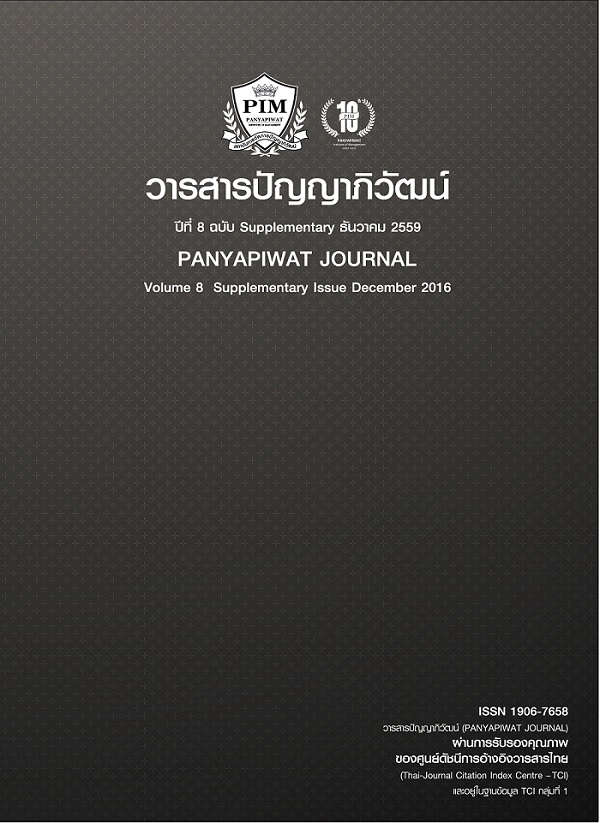UNIVERSITY STUDENTS’ PERCEPTIONS TOWARDS A GOOD UNIVERSITY EFL TEACHER
Main Article Content
บทคัดย่อ
This study investigated how Thai university students in one Thai university context identified the characteristics of a good university English as a foreign language (EFL) teacher. To collect data, a questionnaire was employed with 403 students [175 English major students and 228 non-English major students at Albus University (pseudonym) in order to perceive the characteristics of an effective EFL teacher. The returned questionnaire allowed a researcher to list the top 5 effective EFL teacher characteristics of each group of participants. English major students listed (1) explaining clearly, (2) knowing the subject well, (3) entertaining, (4) motivate students to learn language, and (5) having good teaching methods as the characteristics of an effective EFL teacher. According to non-English major students’ responses, they were the same to some extent, i.e. explaining clearly, entertaining, and having good teaching methods. Also there were some different characteristics to some extent such as having impartiality, having sense of humor, and creating a comfortable atmosphere. Moreover, altogether 27 students at Albus University (a pseudonym) agreed to be interviewed. Findings from the interview allowed the researcher to identify what these students perceived as the characteristics of a good university EFL teacher. They were: (1) ability to explain clearly, (2) knowledge of the subject matter, (3) ability to entertain students, (4) ability to motivate students to learn, (5) ability to teach, (6) fairness, and (7) sense of humor.
งานวิจัยฉบับนี้เป็นการศึกษาทัศนะของนักศึกษาไทยในมหาวิทยาลัยแห่งหนึ่งของประเทศไทยที่มีต่อบุคลิกลักษณะของอาจารย์ผู้สอนภาษาอังกฤษเป็นภาษาต่างประเทศ โดยมีการเก็บข้อมูลจากแบบสอบถามและการสัมภาษณ์จากนักศึกษาจำนวน 403 คนของมหาวิทยาลัยอัลบัส (นามสมมติ) จำแนกเป็นนักศึกษาสาขาวิชาภาษาอังกฤษจำนวน 175 คน และเป็นนักศึกษาจากสาขาวิชาอื่นๆ จำนวน 228 คน นักศึกษาทั้งหมดได้มีการทำแบบสอบถามเกี่ยวกับทัศนะที่มีต่อบุคลิกลักษณะที่ดีของอาจารย์ผู้สอนภาษาอังกฤษเป็นภาษาต่างประเทศ โดยผลจากการตอบแบบสอบถามทำให้ผู้วิจัยสามารถจำแนกบุคลิกลักษณะที่ดีของอาจารย์ผู้สอนภาษาอังกฤษเป็นภาษาต่างประเทศ 5 อันดับแรก ดังนี้ นักศึกษาสาขาวิชาภาษาอังกฤษมีความเห็นว่า อาจารย์ผู้สอนภาษาอังกฤษเป็นภาษาต่างประเทศทีดีนั้นต้องมีบุคลิกลักษณะต่อไปนี้ 1) สามารถอธิบายความได้อย่างชัดเจน 2) มีความรู้ด้านวิชาที่สอนเป็นอย่างดี 3) สามารถสร้างความสนุกสนานได้ 4) สามารถกระตุ้นให้ผู้เรียนอยากเรียนรู้ภาษา และ 5) มีวิธีการสอนที่ดี ส่วนทัศนะของนักศึกษาจากสาขาวิชาอื่นๆ นั้นมีบางคำตอบที่คล้ายกับนักศึกษาสาขาวิชาภาษาอังกฤษ คือ สามารถอธิบายความได้อย่างชัดเจน สามารถสร้างความสนุกสนานได้ และมีวิธีการสอนที่ดี ส่วนทัศนะมีต่อบุคลิกลักษณะที่ดีของอาจารย์ผู้สอนภาษาอังกฤษเป็นภาษาต่างประเทศที่ไม่เหมือทัศนะของนักศึกษาสาขาวิชาภาษาอังกฤษ คือ อาจารย์ผู้สอนภาษาอังกฤษเป็นภาษาต่างประเทศที่ดีนั้น จำเป็นต้องมีความยุติธรรม มีอารมณ์ขัน และต้องสร้างบรรยากาศการเรียนรู้ภายในห้องเรียน นอกจากนั้นการสัมภาษณ์นักศึกษาจำนวน 27 คน ทำให้ผู้วิจัยได้ข้อมูลเชิงลึกของทัศนะของนักศึกษาที่มีต่อบุคลิกลักษณะที่ดีของอาจารย์ผู้สอนภาษาอังกฤษเป็นภาษาต่างประเทศ ซึ่งคำตอบที่ได้ก็คล้ายคลึงกับคำตอบในแบบสอบถาม ดังนี้ 1) สามารถอธิบายความได้อย่างชัดเจน 2) มีความรู้ด้านวิชาที่สอนเป็นอย่างดี 3) สามารถสร้างความสนุกสนานได้ 4) สามารถกระตุ้นให้ผู้เรียนอยากเรียนรู้ภาษา 5) มีวิธีการสอนที่ดี 6) มีความยุติธรรม และ 7) มีอารมณ์ขัน
Article Details
“ข้าพเจ้าและผู้เขียนร่วม (ถ้ามี) ขอรับรองว่า บทความที่เสนอมานี้ยังไม่เคยได้รับการตีพิมพ์และไม่ได้อยู่ระหว่างกระบวนการพิจารณาลงตีพิมพ์ในวารสารหรือแหล่งเผยแพร่อื่นใด ข้าพเจ้าและผู้เขียนร่วมยอมรับหลักเกณฑ์การพิจารณาต้นฉบับ ทั้งยินยอมให้กองบรรณาธิการมีสิทธิ์พิจารณาและตรวจแก้ต้นฉบับได้ตามที่เห็นสมควร พร้อมนี้ขอมอบลิขสิทธิ์บทความที่ได้รับการตีพิมพ์ให้แก่สถาบันการจัดการปัญญาภิวัฒน์หากมีการฟ้องร้องเรื่องการละเมิดลิขสิทธิ์เกี่ยวกับภาพ กราฟ ข้อความส่วนใดส่วนหนึ่งและ/หรือข้อคิดเห็นที่ปรากฏในบทความข้าพเจ้าและผู้เขียนร่วมยินยอมรับผิดชอบแต่เพียงฝ่ายเดียว”
References
Banno, E. (2003). A cross-cultural survey of students’ expectations of foreign language teachers. Foreign Language Annuals, 36(3), 339-346.
Borg, S. (2006). The distinctive characteristics of foreign language teachers. Language Teaching Research, 10(1), 3-31.
Brosh, H. (1996). Perceived characteristics of the effective language teacher. Foreign Language Annuals, 29(2), 125-138.
Chen, Y. J. & Lin, S. C. (2009). Exploring characteristics for effective EFL teachers from the perceptions of junior high school students in Tainan. STUT Journalof Humanities and Social Sciences, 2, 29-249.
Darling-Hammond, L. (1999). Teacher quality and student achievement: A review of state policy evidence. Center of the Study of Teaching and Policy, University of Washington.
Gillard, J. E. (2010). Speech: Teach for Australia Reception. Retrieved May 24, 2012, from www.deewr.gov.au/Ministers/Gillard/Media/Speeches/Article_100122_074612.aspx
Hasekawa, A. (2004). Student demotivation in the foreign language classroom. Takushoku Language Studies, 107, 119-136.
Hongboontri, C., Prakongchati, N. & Thirakunkovit, S. (2010). Characteristics of English as a foreign language (EFL) teacher as identified by students and professional. The 3rd Annual Thailand TESOL International Conference, “ELT in the next decade: Sharing, caring, and daring,” Bangkok, Thailand.
Intraboonsom, C. (2007). University teachers and learners revealing their perceived Characteristics of an effective university EFL teacher. MA. Dissertation, Mahidol University.
Michie, G. (1999). Holler if you hear me: The education of a teacher & his students. NY: Teacher College Press.
Rhee, M. (2010). Putting kids first. In K. Weber (ed.). Waiting for “superman”. NY: Participant media.
Sriprasert, A. (2011). Thai university students’ voices towards EFL curriculum and instruction. MA. Dissertation, Mahidol University.
Strauss, A. & Corbin, J. (1990). Basic of qualitative research: Techniques and procedures for developing grounded theory. Newbury Park, CA: Sage.
Strauss, A. & Corbin, J. (1998). Basic of qualitative research: Techniques and procedures for developing grounded theory (2nd ed.).Thousand Oaks, CA: Sage.
Walls, R. T., Nardi, A. H., von Munden, A. M. & Hoffman, N.(2002). The characteristics of effective and ineffective teachers. Teacher Education Quarterly, 29(1), 39048.
Wichadee, S. (2009). Characteristics of effective English language teachers: The perspectives of Bangkok university students. Bangkok: Bangkok University.

